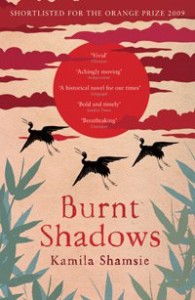 Great news shared by Muneeza Shamsie this morning. Kamila Shamsie’s novel Burnt Shadows is shortlisted in the Orange Prize for Fiction. Congratulations, Kamila!
Great news shared by Muneeza Shamsie this morning. Kamila Shamsie’s novel Burnt Shadows is shortlisted in the Orange Prize for Fiction. Congratulations, Kamila!
Bloomsbury is offering a 24-hour free download offering of Shamsie’s novel, starting April 22 at 12 noon. Visit the site to download the book.
Here is the complete shortlist:
Burnt Shadows, Kamila Shamsie
Scottsboro, by Ellen Feldman
The Wilderness, Samantha Harvey
The Invention of Everything Else, by Samantha Hunt
Molly Fox’s Birthday, Deirdre Madden
Home, by Marilynne Robinson
Read about Kamila Shamsie’s tribute to the three generations of women writers in her family.




